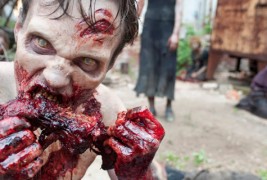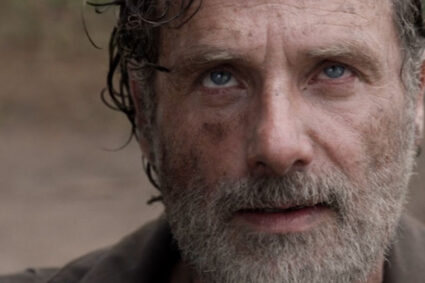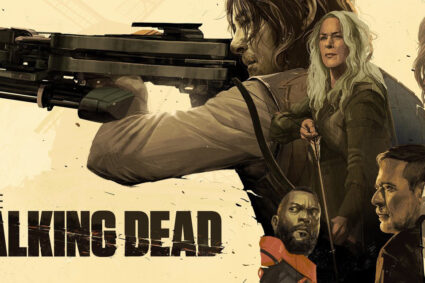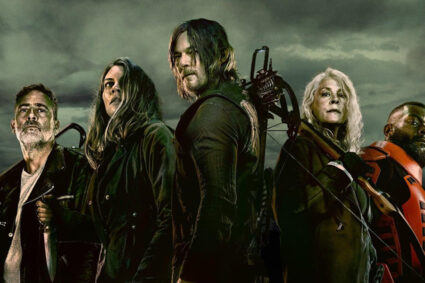
SPOILERS AHEAD!
Season two of The Walking Dead on AMC is now safely in the rearview mirror and after unabashedly heaping praise upon this rare gem of TV terror in my Midterm Report Card, my initial take on the first half of season two remains true: The Walking Dead is among the very best television programs available, regardless of genre, category, or any other distinction.
While it does exist, the overlap between the horror genre and the mainstream’s acknowledgment of achievement in film and television is a dismally small patch of terrain. Silence of the Lambs and Black Swan garnered Oscar attention, but the horror bona fides of these admittedly great works are a whole lot more ambiguous than explicit zombie mayhem. While The Walking Dead managed to snag an award for best prosthetic make up FX, a relative blink on Emmy’s radar screen, something tells me that the inclusion of full on, gory flesh eaters and the adoration of millions of horror nerds will preclude The Walking Dead from taking home anything substantial come Emmy time.
The second half of season two starts where the first half left us: mourning the discovery of Carol’s daughter, Sophia, in the barn among the other “walkers” that Hershel had secreted away in hopes of one day finding a cure to the nightmare that’s laid waste to many of his friends and family and much of the population at large. When the good Dr. Hershel (Scott Wilson), a non-practicing alcoholic, recognizes the folly of his naïve optimism (or stubborn denial), he leaves the safety of the farm and heads to what’s left of the local watering hole, looking for solace in the bottom of a bottle. Rick (Andrew Lincoln) and Glenn (Steven Yeun) head to town to rescue Hershel from himself, not to mention the zombies and other potential threats.
At the bar, Rick and Glenn discover Hershel in his cups when they’re interrupted by a travelling band of scavengers comprised of some unsavory city boys. Two men enter the bar and the situation quickly descends into a threatening one, forcing Rick to shoot and kill them. The other men surround the bar outside and relentlessly fire their weapons, trapping Rick, Glenn, and Hershel inside. Glenn provides a distraction allowing Rick and Hershel to escape, but a zombie horde, attracted to the gunfire, surrounds them. In the ensuing melee, another of the scavengers falls from a roof and impales his leg on a fence. He’s subsequently abandoned by his cohorts. After some high stakes consternation, Rick frees the forlorn scavenger from the fence and our guys escape back to the farm, hostage in tow.
The fate of this hostage is the major thrust of the second half of season two. ‘What to do’ is an admittedly large question. Set him free and risk him returning to the farm with his cohorts? Or kill him, thereby assuring everyone’s safety while crossing an ethical line that, once crossed, permanently alters the morality of everyone involved. What are the larger social, moral, and ethical issues this decision implies?
Predictably, Shane (Jon Bernthal) wants to kill him. Rick wants to set him free many miles outside of town. Dale, ascribing to the socio-cultural norms that existed pre-zombie apocalypse, wants to treat him as one would treat a fellow survivor during hard times. It’s a captivating moral dilemma that has no clear cut solution. One thing is certain: Dale is this group’s soothsayer. He’s Rowdy Roddy Piper in They Live and he’s wearing shades. In other words, Dale sees through every façade worn by his companions. The most important example of this is that he knows Shane’s a murderer, a liar, and dangerous.
When it seems Shane has convinced the group that killing the hostage is the best way to go, Dale is the lone voice of reason and he makes an impassioned appeal to good will and compassion, asking the group to consider what society will be like going forward if people are willing to kill someone to solve a problem that doesn’t exist and may never exist. Dale, played by actor Jeffrey DeMunn, pleads his case with an incredibly powerful monologue. It’s the emotive version of Godzilla, and DeMunn deserves to be recognized for this role. Then again, we are implicitly talking Emmys here. Without getting too far in to spoiler territory, Dale is a martyr and it’s a shame to have to say goodbye to such an interesting, dynamic character and the exceptional actor playing him.
Hershel’s retrospection about Sophia and the other walkers he kept in the barn, as well as the fate of the hostage, seems to validate Shane’s view of the situation from a safety perspective; however, Hershel can sense that Shane is dangerous so he urges Rick to assume the lead on issues involving the group. After Rick reluctantly accepts the role of leader, Shane insidiously pursues a power play as his psyche crumbles along with his sense of morality. Inevitably, Shane plots to kill the hostage as a ploy to lure Rick into his jealous, spiteful clutches, so that he can usurp Rick as Lori’s (Sarah Wayne Callies) lover, Carl’s (Chandler Riggs) father, and the future father to Lori’s unborn child – a baby that may belong to Shane, anyway. Is an unforgettable showdown between the show’s two alpha males inevitable? Yes, but you’ll have to watch to find out what happens!
Unbeknownst to our band of survivors, a sudden, mysterious zombie migration is underway sending a massive zombie horde through Hershel’s farm. Flaming, bloody, bullet-riddled chaos ensues, and thus provides us with a season finale choking with zombie mayhem. Our survivors split off into and onto various vehicles, circling the farm and firing weapons at zombies. Split up and overrun, the vehicles containing our survivors abandon the mission, one by one.
Not everyone makes it out alive and Andrea (Laurie Holden) is mistakenly left for dead back at the farm. Those who make it out eventually regroup on the congested highway where Sophia first was lost. The group decides to trek east using rural roads, but when one of their fleet runs out of gas, it’s decided that everyone should stick together and camp for the night before going for gas in the morning. Here, some dirty laundry is hung out to dry, including the fact that, according to the CDC, everyone is a carrier of the zombie plague. Becoming one of the walking dead doesn’t require getting bitten by a zombie, but rather one only has to die by any means at all to eventually reanimate and be doomed to a fate worse than death. This and other revelations are met with complex, mixed emotions. As the group deals with displacement and loss, some of our heroes appear to be descending into their own darkness.
Meanwhile, back near Hershel’s farm, Andrea is running through the woods, trying to stay ahead of the pursuant zombie horde when she becomes surrounded. Just as all appears lost, she comes face to face with a mysterious, hooded entity sporting two zombie-slaves on leashes, setting up one extraordinarily compelling cliff hanger.
Season two of The Walking Dead has to be considered a resounding success, both aesthetically and from a ratings perspective. The show’s writers have composed a perfect story web, every subplot a strand vital to its integrity and seamlessly interconnected to the whole. The show is lean and economical in its complexity; there are no loose ends, no superfluous filler. It’s great television and it happens to involve zombies. Hallelujah.
Some of the more interesting subplots this season are obvious. The struggle between Rick and Shane for control of the group is an easy one. It’s high stakes drama at its finest. Not only is the collective moral integrity of the entire group at stake, but so is the very nature of some of the most intimate relationships one can have – father/son, husband/wife, lovers, and friends.
Some of the more subtle brush strokes are among the most compelling. The budding, complex relationship between Glenn and Hershel’s daughter Maggie (Lauren Cohan) is an example of turning our expectations upside down while giving us something good and sweet to root for in the midst of intense hopelessness. Hershel’s struggle with alcoholism and how it’s shaped his relationship with his family is one of those characterizations that make this show buzz. It’s another example of the writers giving these characters at least one trait that is entirely at odds with their respective character archetypes, providing us with an ensemble of multidimensional, sympathetic, and most importantly interesting characters.
There are very few negatives to expose, but they do exist. In my Midterm Report Card I reported that actor Norman Reedus’ portrayal of Daryl Dixon, the rugged redneck with a heart of gold, is a highlight of an outstanding second season. His budding romance with Carol and the lengths he’s willing to go to help find her daughter Sophia is at odds with Daryl’s exterior and completely alien to the way his bother Merle (Michael Rooker) carried himself in season one. However, after the series’ holiday hiatus, it seems as though the Daryl/Carol subplot has been deemphasized and that’s a shame.
Another character who’s been virtually absent this entire season is T-Dog (Irone Singleton). There’s unrealized potential in the fact that T-Dog, the show’s lone black character, and Merle, Daryl’s racist brother, were foils whose entire relationship was defined by racial tension in season one. It’s difficult to fathom why that scenario wasn’t extrapolated by showing us the ways in which T-dog and Daryl coexist in the wake of Merle’s apparent death. I understand that ensembles this large are bound to under-represent certain characters, but the appeal of the aforementioned scenario seems like a no-brainer.
Finally, I’ll leave you with this: Despite all the carnage and excitement, the Season Two Finale was the worst episode of an outstanding season that delivered homerun after homerun, week after week. This is true only in relative terms of course, because on its own merits the finale certainly isn’t a bad episode. It is, though, essentially an hour-long plot device that serves the purpose of removing our group from the farm and onto the next chapter of the broader story. And while it contains plenty of red meat for the vocal minority of fans that contend the show skimps on zombie action, it also serves as Exhibit-A for the case that zombie mayhem alone cannot adequately sustain an entire episode, let alone an entire series, but I digress. Season two of The Walking Dead is outstanding.
The Walking Dead is A-plus storytelling, regardless of form, media, or genre. Lucky for us, it’s also legitimate, unambiguous horror. Genre material this well-executed comes along once every generation so enjoy it while it lasts, Horror Fans, because unlike the show’s titular shambling ghouls, when it’s gone, it’s gone.














